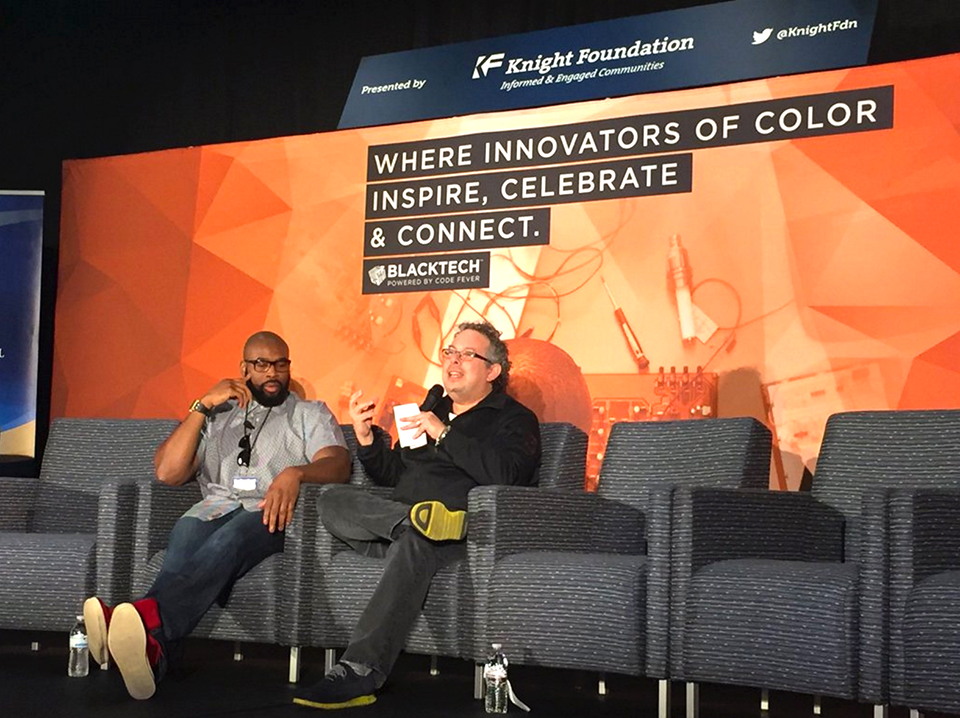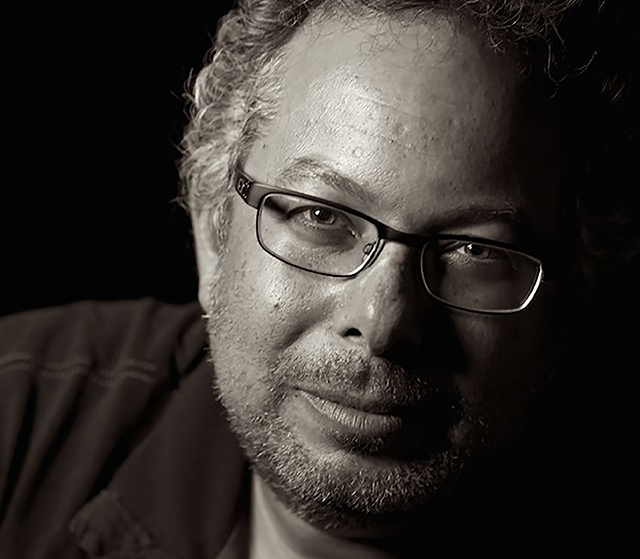
Magic Leap: The Force is strong with this one

Above: NFL veteran Israel Idonije with Rony Abovitz, president, CEO and founder of Magic Leap, during their discussion at Black Tech Week. Photo by Rosemary D’Amour. Top: A photo illustration of Magic Leap technology at work, Photo courtesy Magic Leap.
Magic Leap CEO Rony Abovitz had a message for budding entrepreneurs at Black Tech Week in Miami recently, and it came right out of “Star Wars.” “Being an entrepreneur is a spiritual journey. Will you go Jedi, or will you go Sith?”
The sci-fi analogy was fitting for the founder of a company that has managed to position itself as the future of human-computer interaction, raising $1.4 billion in venture capital, and leaking small glimpses of an “augmented reality” future.

Rony Abovitz, president, CEO and founder of Dania Beach-based Magic Leap. Photo courtesy Magic Leap.
Abovitz opened a window into the potential of the Magic Leap platform, but he made clear that he wants his company to look much more like the Rebel Alliance – the diverse interplanetary union defended by the Jedi – than the Sith’s Galactic Empire, staffed by legions of all-white Storm Troopers.
“We don’t want to look like a Silicon Valley company,” overwhelmingly staffed by white or Asian men, he said, urging the Black Tech Week attendees to apply and spread the word that Magic Leap planned to hire “several thousand” staff in South Florida in the next few years.
Magic Leap lists around 125 openings, mainly technical, at its headquarters north of Miami in Dania Beach, and another 30 or so at five other locations, according to its website. The company has “north of 500” employees at the moment, a spokesman said.
The company is one of the country’s best-capitalized startups, and Abovitz said it had turned down numerous funders. How to choose investors? “The wand finds you,” he said.
Magic Leap has been very cautious about letting the wider world see its hardware or software. Those who have seen it say the company is developing a device that projects images onto the retina to allow people to interact with both virtual reality and physical reality simultaneously.
The MIT Technology Review called it the No. 1 breakthrough technology of 2015. Abovitz’s comments illustrated a number of of possible applications of the emerging technology.
-
Gaming. This jumped off the stage because Abovitz was on the stage with former NFL defensive lineman Israel Idonije, who described a game he was working to bring to life that had athletes from around the globe — all with licensed likenesses — stepping up to save the world from some kind of existential threat.
-
Medicine. Abovitz helped build a successful medical device company, Mako Surgical, so it’s no surprise that he sees Magic Leap working in this area. One way could be cognitive behavioral therapy, where people can meet and master their phobias. He suggested that the Magic Leap experience could help revitalize the damaged nerves of some people who are paralyzed, because unlike virtual and augmented reality, “what we are doing is neurologically true.”
-
Education. Abovitz asserted that it would be transformational, because students would learn in an immersive, interactive way. So much for reading books and imagining dragons.
Abovitz said the Magic Leap platform would be open to all developers. The problem it tries to solve? “How do we activate the joyful center of people.”
“We’re building a hyperpersonal computer; it’s mobile, and I think it will actually blow your mind in a good way,” he said.
Magic Leap is cagey about when it will release a product, but the tech press predicts it’s still a year or so away. It will also take time to see if Magic Leap’s effort to build a diverse company will be realized.
Abovitz makes few public appearances, so his decision to attend Black Tech Week with a recruiting message was significant. The company declined to say what other efforts it planned to make to attract a diverse workforce.
Some advice came from the next speaker, Leslie Miley, the black engineer who left Twitter over the company’s abysmal diversity efforts. He said the argument that “we’re trying, but there just aren’t enough women/black/Hispanic engineers” was a way of abdicating responsibility.
His message to the big tech companies: Put an engineering center in Detroit, put an engineering center in South Central Los Angeles, and let the people who live there earn their way to success.
Abovitz, for his part, voiced his determination to do the right thing. “Going Jedi is hard—not taking short cuts—but if you are determined, the world will open up. You’ll find that friend; you’ll get that hand.”
Andrew Sherry is vice president of communications at Knight Foundation. Email him at [email protected] or connect with him on Twitter@andysherry.

A photo illustration of Magic Leap technology at work; photo courtesy Magic Leap.
Recent Content
-
Community Impactarticle ·
-
Community Impactarticle ·
-
Community Impactarticle ·


